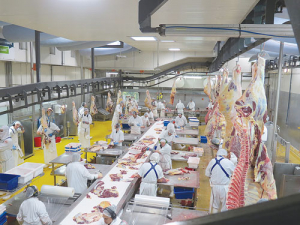Callaghan Innovation: Connecting industry problems with startup solutions
Gaining exposure to relevant innovation, "without being swamped in the sheer volume of options", is one of the main challenges for winegrowers considering agrictech.
 New technologies have potential to provide and export and tracking service for high-quality food producers.
New technologies have potential to provide and export and tracking service for high-quality food producers.
Blockchain and distributed ledger technologies have the potential to help our primary industries capture high-value niches, according to a new report.
They can help the sector connect more directly to consumers through supply chain innovations.
The report was commissioned by the Callaghan Innovation and blockchain venture studio Centrality.
The report ‘Distributed Ledgers and Blockchains – Opportunities for New Zealand’ by author Joshua Vial from entrepreneurial company Enspiral, outlined several blockchain initiatives now being used in the primary sector.
One example of primary sector work given in the December report is the AsureQuality Food Trust Framework.
NZ Post, AsureQuality (AQ) and NZ Trade and Enterprise have joined forces with Alibaba and local blockchain companies Trackback and Sylo to provide an export and tracking service for local, high-quality food producers.
“The project has been in development for over 14 months and is currently in a pilot phase. Chinese consumers consider fraudulent activity to be pervasive and a primary barrier to accessing safe food,” the report says.
“By scanning an AQ Assured Assurance Mark on their mobile phone a consumer can confirm their purchase is genuine and safe. Additionally, the project aims to connect NZ producers directly with Chinese consumers and remove intermediaries while maintaining high margins on premium products.”
The first participant is the HUI Maori collective to launch a broad offering of high-quality wine, manuka honey, natural snack bars and tonic water direct to Chinese consumers through an ecommerce platform.
The report says several projects here and overseas are focused on solving supply chain problems with distributed ledgers, which could have a significant impact on NZ’s primary industries.
NZ Post and Fonterra are also partnering with Alibaba to use blockchain technology to track consumers’ orders in an effort to increase food safety.
Centrality’s Trackback project is in live trials of a supply chain traceability solution to showcase NZ products in international markets.
Australian-based Blockgrain uses blockchain technology to help participants in the grain supply chain make better informed decisions, eliminate paperwork, reduce inefficiency and risk, open markets and increase profits.
Provenance is a blockchain company from the United Kingdom that is creating and fostering open, accessible information about products to transform the global economy. The company has completed pilot projects focused on tracing sustainably caught tuna and proving that farmers have received fair compensation.
Fonterra’s impending exit from the Australian dairy industry is a major event but the story doesn’t change too much for farmers.
Expect greater collaboration between Massey University’s school of Agriculture and Environment and Ireland’s leading agriculture university, the University College of Dublin (UCD), in the future.
A partnership between Torere Macadamias Ltd and the Riddet Institute aims to unlock value from macadamia nuts while growing the next generation of Māori agribusiness researchers.
A new partnership between Dairy Women’s Network (DWN) and NZAgbiz aims to make evidence-based calf rearing practices accessible to all farm teams.
Despite some trying circumstances recently, the cherry season looks set to emerge on top of things.
Changed logos on shirts otherwise it will be business as usual when Fonterra’s consumer and related businesses are expected to change hands next month.

OPINION: Here w go: the election date is set for November 7 and the politicians are out of the gate…
OPINION: ECan data was released a few days ago showing Canterbury farmers have made “giant strides on environmental performance”.